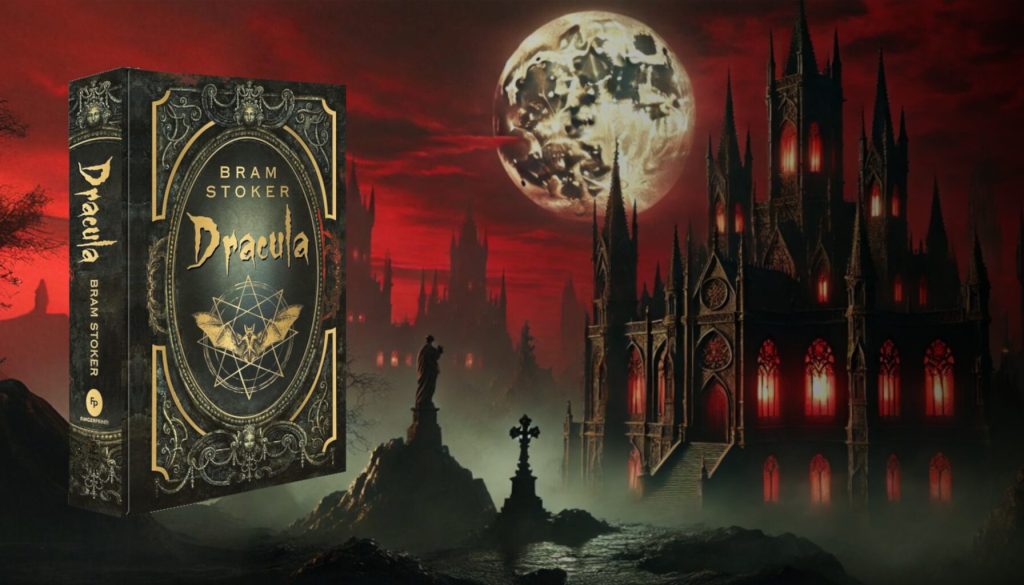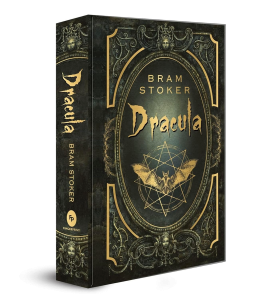
Welcome to my monthly book recommendation for January! Every month, I recommend a book that I’ve personally read and find worthwhile enough to recommend to my own readers. In each post, I’ll introduce the book, discuss why I found reading it worthwhile, and the major themes the book touches upon. I won’t include any major spoilers, but I may discuss some of the characters and specific details or locations from within the book.
My recommendation for January 2025 is Dracula by Bram Stoker.
Dracula - Bram Stoker
Available on Amazon
 Author: Bram Stoker
Author: Bram Stoker
Genres: Horror, Fantasy
Description:
Experience the timeless horror of Bram Stoker’s classic tale, ‘Dracula.’ From the misty forests of Transylvania to the shadowy streets of Victorian London, follow the journey of young solicitor Jonathan Harker as he encounters the enigmatic Count Dracula and becomes ensnared in a web of blood, terror, and supernatural intrigue. Featuring iconic characters like Van Helsing, Mina Harker, and the bloodthirsty vampire brides, ‘Dracula’ is a chilling masterpiece of gothic horror that has terrified readers for over a century.
My Thoughts
Bram Stoker’s Dracula is a story that captivates not just through its gothic atmosphere but through the deliberate care in its storytelling. The storyline unfolds from the diary entries of the main characters. These entries read as if their contents are unfolding in real time, and each character describes the events they’ve witnessed with enough precision to enable the story to proceed with full continuity. In contrast, each entry also gives elements of that character’s internal thoughts colored with their personal beliefs, hopes, and relationships with those around them, giving us an interesting juxtaposition of character insights, sliced throughout. This is an interesting literary device, one that can only work if the characters are trustworthy and are capable of thinking about their situations objectively. In Dracula, they’re both, enough to enable us to understand the true series of events as they unfold. Opinions and biases the characters may have don’t interfere with their ability to give an accurate recounting.
Unlike most stories, this doesn’t have a single sequence of rising action leading to a story-ending climax. The first major series of events nearly constitutes its own full story, a story with fast-rising tension and increasing stakes, until we reach a cliffhanger that’s quickly left dangling as the narrative moves to a different set of characters. From there, multiple series of rising action and climaxes take place, each of which inevitably leads to the next, until we reach the final sequence, once which I can’t describe at all without risk of spoiling it. I find that the effects of the author’s decision to distribute the major events of the story in this manner leads to an interesting sense of pacing, one that keeps you slightly off rhythm throughout while keeping a certain level of rising tension, as if there were a constant slow-burn pervading underneath the shorter sequences of tension and release.
Dracula explores a number of themes, including the dichotomies of good vs. evil, corruption vs. purity, and superstition vs. scientific inquiry. Stoker doesn’t simply enact conflict between the opposing sides of each dichotomy, he entangles them, creating what I consider to be a fascinating, almost paradoxical juxtaposition of these opposing viewpoints. The opposing sides don’t diminish each-other, they strengthen in the face of their opposites. Things aren’t always black-and-white, but they aren’t always even gray either. Sometimes they’re akin to a swirling mixture of the two colors that never quite homogenizes. This lends itself to the rising tension throughout the sequences of rising action, particularly those of the last sequence. This also greatly contributes to the characters’ internal developments and external struggles.
Stoker masterfully executes the battles between Dracula and the protagonists who stumbled into his operations. I think of their conflict as an example of asymmetric warfare. Dracula has certain superhuman abilities as a vampire, but he also has certain weaknesses of which the protagonists are immune. I enjoyed the characters’ explorations of the capabilities and limitations of Dracula’s vampiric nature and its associated abilities and weaknesses. Stoker didn’t set everything in stone from the start, and nobody had perfect knowledge of Dracula’s abilities, himself included. Despite being a book on the supernatural, there was a sense of scientific inquiry present throughout. The scientific method has a place even in a world of supernatural beings. The protagonists utilize this to help bolster themselves in their dangerous endeavors to directly oppose Dracula.
Dracula to this day remains both a thrilling tale of suspense and an exploration of profound themes. Stoker doesn’t just pit his characters against a supernatural antagonist; he positions them in a world where reason and belief collide, and where triumph demands both ingenuity and faith in one-another. The story’s structure and pacing continually challenge the reader to anticipate and adapt, much like the characters themselves. The novel ultimately weaves a tale that is as much about human resilience as it is about battling the unknown, a haunting and unforgettable journey that lingers beyond its last words.